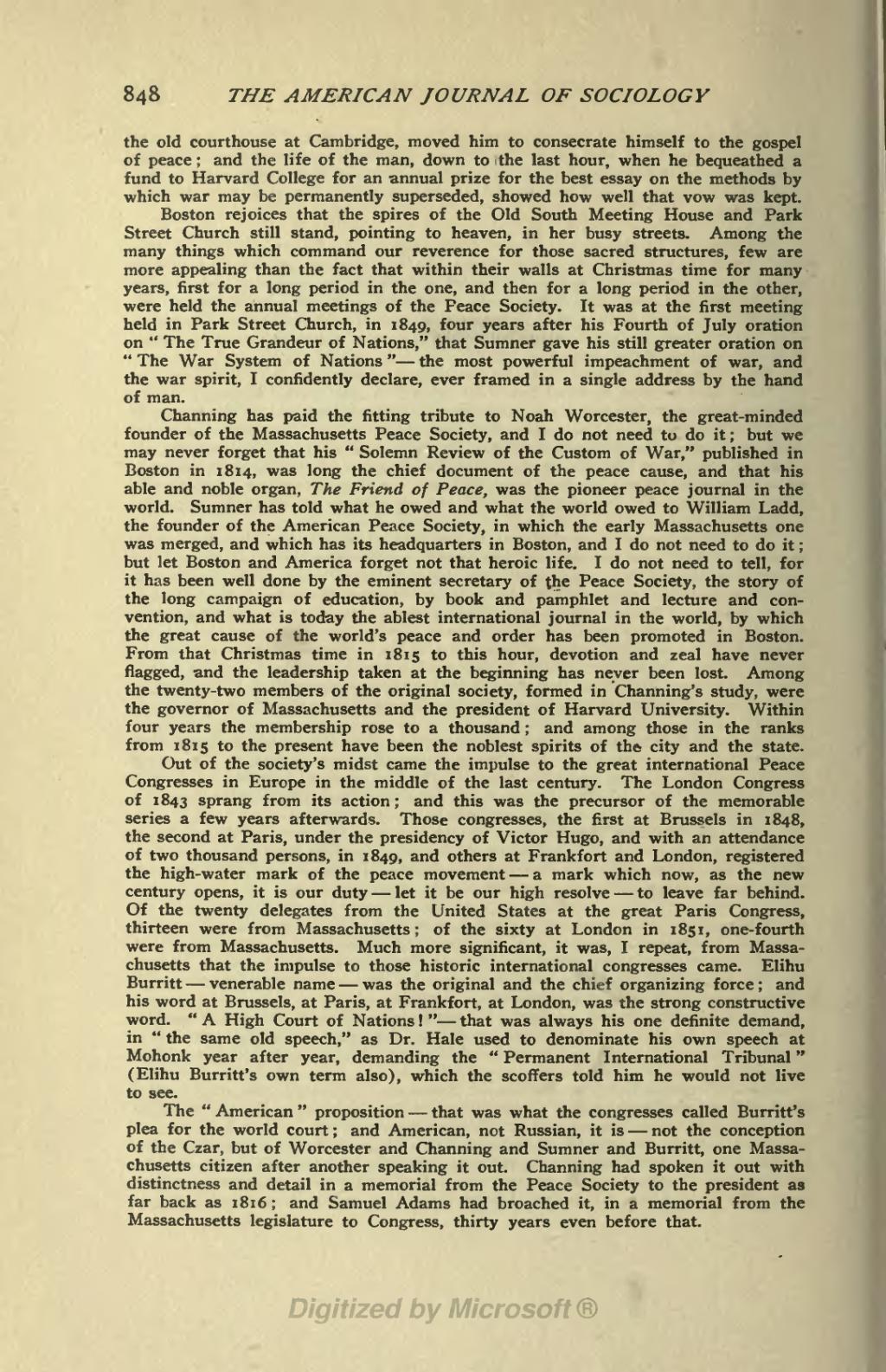84& THE AMERICAN JOURNAL OF SOCIOLOGY
the old courthouse at Cambridge, moved him to consecrate himself to the gospel of peace ; and the life of the man, down to ithe last hour, when he bequeathed a fund to Harvard College for an annual prize for the best essay on the methods by which war may be permanently superseded, showed how well that vow was kept.
Boston rejoices that the spires of the Old South Meeting House and Park Street Church still stand, pointing to heaven, in her busy streets. Among the many things which command our reverence for those sacred structures, few are more appealing than the fact that within their walls at Christmas time for many years, first for a long period in the one, and then for a long period in the other, were held the annual meetings of the Peace Society. It was at the first meeting held in Park Street Church, in 1849, four years after his Fourth of July oration on " The True Grandeur of Nations," that Sumner gave his still greater oration on " The War System of Nations " the most powerful impeachment of war, and the war spirit, I confidently declare, ever framed in a single address by the hand of man.
Channing has paid the fitting tribute to Noah Worcester, the great-minded founder of the Massachusetts Peace Society, and I do not need to do it ; but we may never forget that his " Solemn Review of the Custom of War," published in Boston in 1814, was long the chief document of the peace cause, and that his able and noble organ, The Friend of Peace, was the pioneer peace journal in the world. Sumner has told what he owed and what the world owed to William Ladd, the founder of the American Peace Society, in which the early Massachusetts one was merged, and which has its headquarters in Boston, and I do not need to do it ; but let Boston and America forget not that heroic life. I do not need to tell, for it has been well done by the eminent secretary of the Peace Society, the story of the long campaign of education, by book and pamphlet and lecture and con- vention, and what is today the ablest international journal in the world, by which the great cause of the world's peace and order has been promoted in Boston. From that Christmas time in 1815 to this hour, devotion and zeal have never flagged, and the leadership taken at the beginning has never been lost. Among the twenty-two members of the original society, formed in Channing's study, were the governor of Massachusetts and the president of Harvard University. Within four years the membership rose to a thousand ; and among those in the ranks from 1815 to the present have been the noblest spirits of the city and the state.
Out of the society's midst came the impulse to the great international Peace Congresses in Europe in the middle of the last century. The London Congress of 1843 sprang from its action; and this was the precursor of the memorable series a few years afterwards. Those congresses, the first at Brussels in 1848, the second at Paris, under the presidency of Victor Hugo, and with an attendance of two thousand persons, in 1849, and others at Frankfort and London, registered the high-water mark of the peace movement a mark which now, as the new century opens, it is our duty let it be our high resolve to leave far behind. Of the twenty delegates from the United States at the great Paris Congress, thirteen were from Massachusetts; of the sixty at London in 1851, one- fourth were from Massachusetts. Much more significant, it was, I repeat, from Massa- chusetts that the impulse to those historic international congresses came. Elihu Burritt venerable name was the original and the chief organizing force ; and his word at Brussels, at Paris, at Frankfort, at London, was the strong constructive word. " A High Court of Nations ! " that was always his one definite demand, in " the same old speech," as Dr. Hale used to denominate his own speech at Mohonk year after year, demanding the " Permanent International Tribunal " (Elihu Burritt's own term also), which the scoffers told him he would not live to see.
The " American " proposition that was what the congresses called Burritt's plea for the world court ; and American, not Russian, it is not the conception of the Czar, but of Worcester and Channing and Sumner and Burritt, one Massa- chusetts citizen after another speaking it out. Channing had spoken it out with distinctness and detail in a memorial from the Peace Society to the president as far back as 1816 ; and Samuel Adams had broached it, in a memorial from the Massachusetts legislature to Congress, thirty years even before that.
